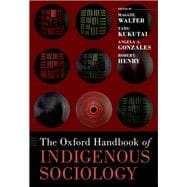Indigenous sociology makes visible what is meaningful in the Indigenous social world. This core premise is demonstrated here via the use of the concept of the Indigenous Lifeworld in reference to the dispossessed Indigenous Peoples from Anglo-colonized first world nations. Indigenous lifeworld is built around dual intersubjectivities: within peoplehood, inclusive of traditional and ongoing culture, belief systems, practices, identity, and ways of understanding the world; and within colonized realties as marginalized peoples whose everyday life is framed through their historical and ongoing relationship with the colonizer nation state.
The Oxford Handbook of Indigenous Sociology is, in part, a response to the limited space allowed for Indigenous Peoples within the discipline of sociology.
The very small existing sociological literature locates the Indigenous within the non-Indigenous gaze and the Eurocentric structures of the discipline reflect a continuing reluctance to actively recognize Indigenous realities within the key social forces literature of class, gender, and race at the discipline's center.
But the ambition of this volume, its editors, and its contributors is larger than a challenge to this status quo. They do not speak back to sociology, but rather, claim their own sociological space. The starting point is to situate Indigenous sociology as sociology by Indigenous sociologists. The authors in The Oxford Handbook of Indigenous Sociology, all leading and emerging Indigenous scholars, provide an authoritative, state of the art survey of Indigenous sociological thinking. The contributions in this Handbook demonstrate that the Indigenous sociological voice is a not a version of the existing sub-fields but a new sociological paradigm that uses a distinctively Indigenous methodological approach.








